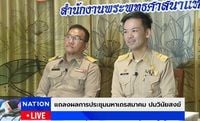In a sweeping and unprecedented move, Thailand's Buddhist leadership and law enforcement agencies have launched a coordinated crackdown on a scandal involving senior monks and a woman known only as "Sika Golf." The case, which has rattled the foundations of the Buddhist Sangha and shaken public faith, centers around allegations of sexual misconduct, financial impropriety, and violations of monastic discipline among more than 20 monks across several provinces.
The Office of National Buddhism (ONAB) issued a stark warning to monks on July 13, 2025, outlining eight specific behaviors exhibited by women that monks should be particularly wary of. This advisory came in the wake of revelations that multiple revered monks were implicated in inappropriate relationships and financial dealings with Sika Golf, a woman whose interactions with the clergy have sparked national outrage and concern.
Among the behaviors flagged by ONAB were women who present themselves with luxury and generosity—offering donations or meals with overt displays of reverence—and who seek to establish close communication channels, such as requesting Line IDs for video calls. The advisory cautioned monks against falling prey to emotional manipulation, including claims of past-life connections, gifts of substantial wealth, and invitations to private or sexual encounters via video calls. The Office urged monks to adhere strictly to the Buddha's guidance on interactions with women, emphasizing restraint, mindfulness, and avoidance wherever possible.
Behind the scenes, the Mahathera Samakhom (SSC), the highest governing body of the Thai Sangha, convened an urgent special meeting at Wat Bowonniwet Vihara on July 13, 2025. The meeting, lasting over 90 minutes, brought together senior monastic leaders, including Phra Phromkwavee, abbot of Wat Kanlayanamit, whose temple is among those implicated. The SSC discussed the gravity of the scandal, which has not only damaged the image of Buddhism but also challenged the integrity of monastic governance.
Mr. Inthaporn Chankaew, Director-General of ONAB and Secretary of SSC, disclosed that 11 monks have been formally implicated. Of these, six have already renounced their monkhood, including notable figures such as former Phra Thep Wachirapamok (known as Chao Khun Arch) and former Phra Maha Bunloet Chuathani. These individuals, no longer monks, are beyond the reach of monastic disciplinary procedures but remain subject to civil and criminal law should evidence show misuse of temple funds or other crimes.
The remaining five monks' statuses are under scrutiny. The SSC has requested police to provide detailed evidence to assist in disciplinary evaluations. These monks have been summoned to clarify their involvement, with failure to appear resulting in severe disciplinary measures, including suspension or removal from office.
Police investigations have unearthed troubling financial links involving four prominent temples: Wat Chujit Dhammaram in Phra Nakhon Si Ayutthaya, Wat Yai Chom Prasat in Samut Sakhon, Wat Kanlayanamit Woramahawihan, and Wat Prayurawongsawat Worawihan in Bangkok. Particularly alarming is the discovery that the abbot of Wat Yai Chom Prasat transferred over 1 million baht to Sika Golf's accounts, raising questions about the use of temple funds for personal transactions.
Authorities are also probing whether Sika Golf engaged in extortion or coercion. So far, evidence suggests her relationships with senior monks were personal, involving financial support for her own use rather than systematic blackmail. However, investigations continue as police gather more evidence.
Two provincial abbots, Phra Kru Phichit and Phra Kru Phitsanulok, have also come under scrutiny for transferring money from personal accounts to Sika Golf. This aligns with police assertions that several monks may face the gravest monastic penalty, parajika, which entails permanent expulsion from the monkhood due to serious breaches such as sexual misconduct.
Complicating matters, some implicated monks have attempted to evade authorities, utilizing legal maneuvers to refuse meetings and withholding information. Others have assembled legal teams to contest the allegations, signaling a protracted legal and disciplinary battle ahead.
The SSC has responded decisively, instructing all levels of monastic administration—from abbots to provincial Sangha leaders—to intensify oversight and swiftly investigate any suspected violations of monastic discipline. The SSC emphasized that disciplinary actions will be conducted with utmost respect for justice, human dignity, and the presumption of innocence until proven guilty.
To address systemic shortcomings, the SSC has called for a comprehensive review and modernization of the Sangha Act of 2505 BE (1962 CE), which currently governs monastic conduct and administration. ONAB has been tasked with forming a working committee to draft amendments that better reflect contemporary challenges and ensure more effective enforcement mechanisms.
The SSC's resolutions include establishing a special committee to revisit regulations surrounding monastic offenses, particularly those involving serious breaches (krukabat). They also plan to request a royal verdict from the Supreme Patriarch to formalize defrocking decisions where warranted.
Public communication will be carefully managed to prevent misinformation and protect the rights of all parties involved. The SSC urged media outlets to verify names and images before publication to avoid unjust harm.
This scandal has ignited a national conversation about the accountability of religious figures and the need for structural reforms within Thailand's Buddhist institutions. The involvement of high-ranking monks and the scale of financial irregularities have prompted calls for greater transparency and legal oversight.
As investigations continue, the Buddhist community and Thai society at large watch closely, hopeful that justice will be served and that the sanctity of the Sangha will be restored. The case of Sika Golf stands as a stark reminder of the vulnerabilities within revered institutions and the importance of vigilance, integrity, and reform.

